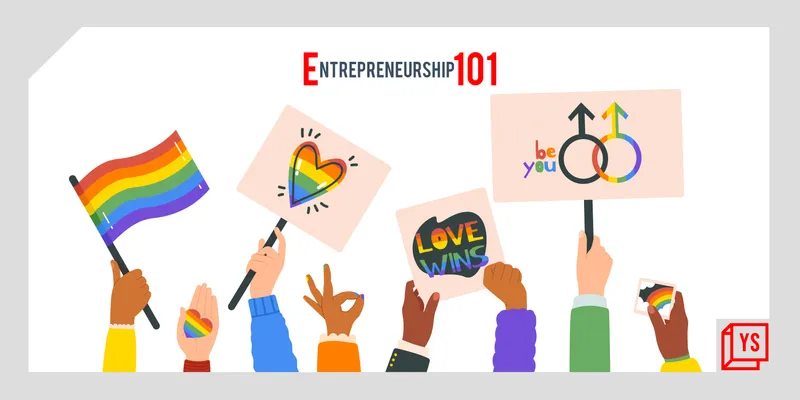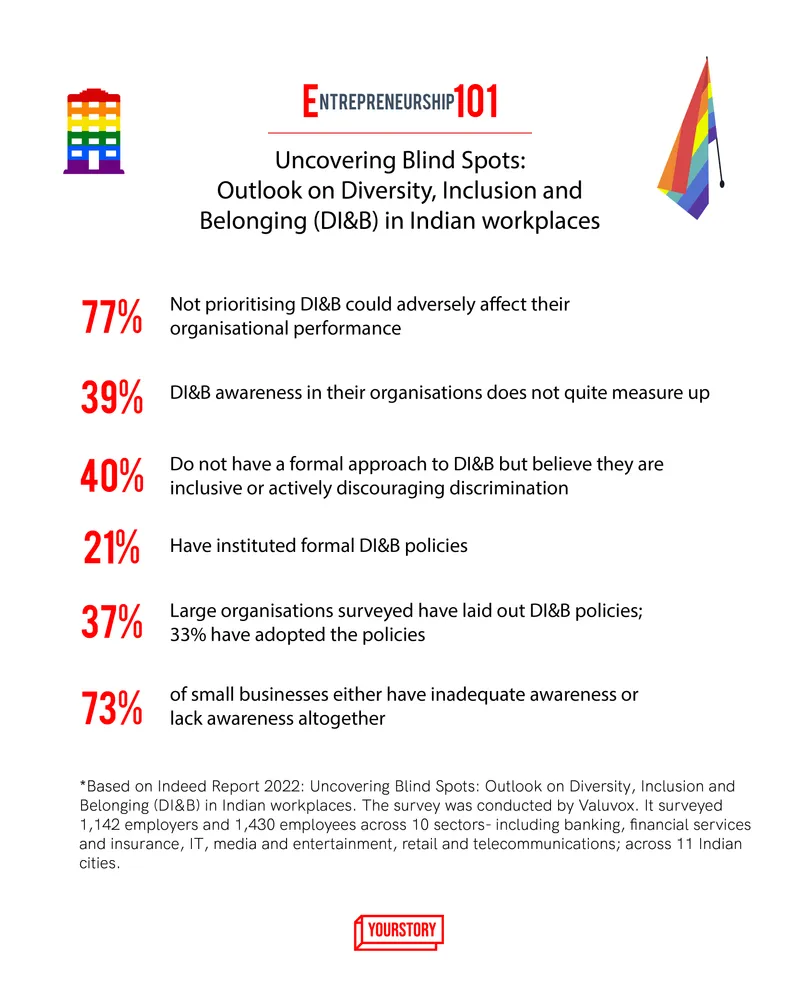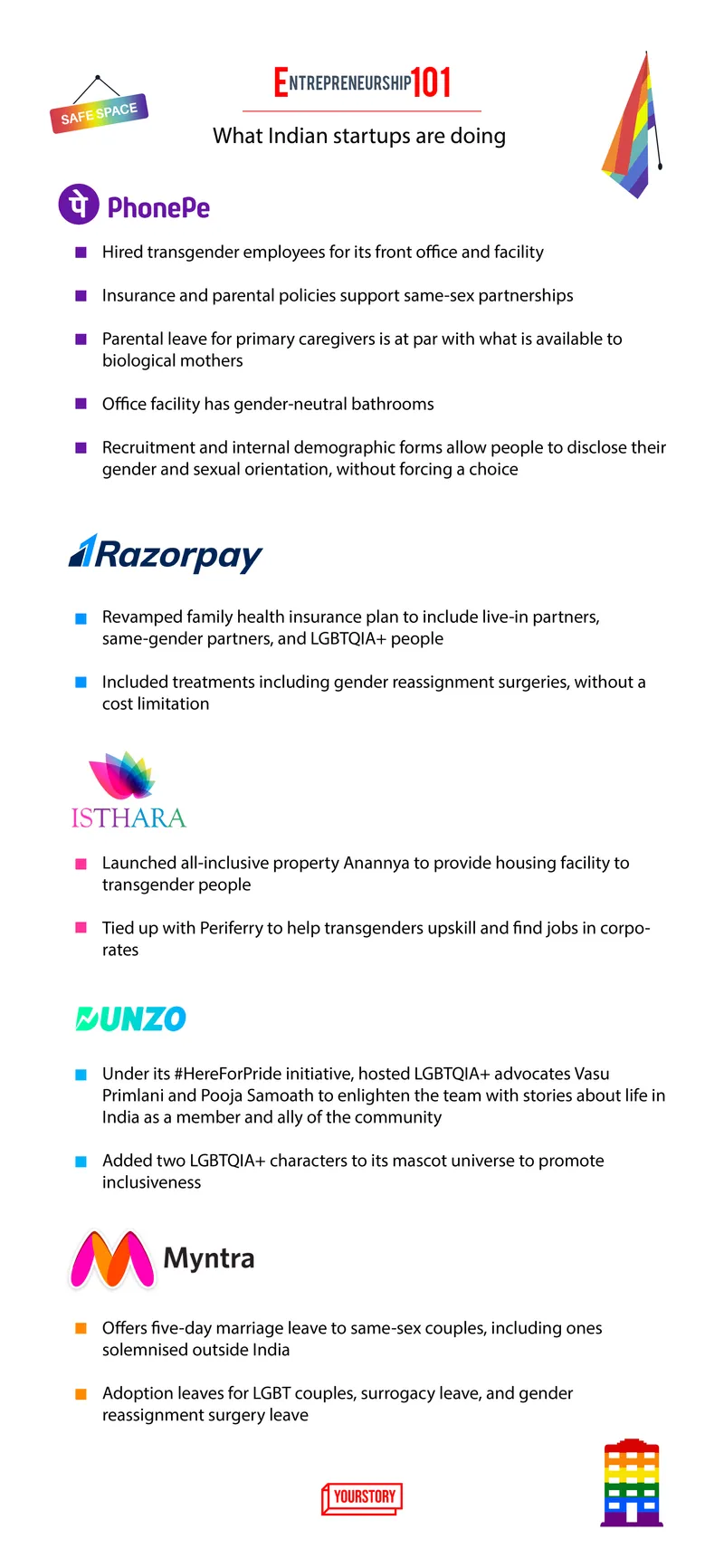Entrepreneurship 101: How can Indian startups be really inclusive?
This week, Entrepreneurship 101 dives into how companies are building inclusive and safe spaces for the LGBTQIA+ community, what Indian startups are doing in this regard, and more.
In Bengaluru’s Marathahalli, bright rainbow-coloured gates outside the Wells Fargo Centre indicate that the multinational financial services company is celebrating Pride Month. A couple of kilometres ahead, a rainbow flag adorns HSBC Electronic Data Processing’s office.
The rainbow flag or the pride flag is symbolic of the LGBTQIA+ (an inclusive term for all genders and sexualities) movement. Every June, brands across the globe don the rainbow to celebrate Pride month, often incorporating the rainbow flag into their branding.
But what happens after June 30? In Entrepreneurship 101, YourStory dives deep to understand where India Inc stands when it comes to inclusivity for the queer community.

Companies leading the way
A survey conducted by Glassdoor in 2020 revealed that 76 percent of job seekers and employees considered a diverse workplace as an important factor in evaluating job opportunities and companies.
The India Workplace Equality Index 2021, which lists companies that have successfully embedded LGBTQIA+ inclusion in their policies—external communication and hiring practices—while demonstrating long-term and in-depth commitment towards queer inclusion, highlights companies including Accenture, Bain & Company, Boston Consulting Group, Deloitte, IBM, Tata Steel, and Thoughtworks.
Digital payments solution provider PayU recently celebrated Pride Month by launching new initiatives to foster a more inclusive and safer working environment. It expanded its medical insurance policy to include hormone therapy, gender affirmation surgery, and related pre- and post-care expenses.
In 2019, Tata Steel rolled out an HR policy to enable colleagues from the LGBTQIA+ community to avail benefits permissible under the law for their partners. These include child care leave, parental leave, medical benefits, employee assistance programmes, joint house points, health check-ups, transfer and relocation benefits, and domestic travel policy.
Before that, the company had also launched WINGS—an LGBTQIA+ employee resource group—in 2018. Earlier this year, it onboarded 12 LGBTQIA+ employees at its Kalinganagar plant. In fact, Tata Steel has been making it to the India Workplace Equality Index’s top employer for LGBT+ inclusion list since 2020.
Last year, Axis Bank introduced all-gender restrooms and offered mediclaim benefits to all employees’ partners, irrespective of their sex, gender, or marital status.

In the SMB space, Rajasthan-based Saraf Furniture has Gender Affirmation and Sexual Harassment Prevention policies in place.
The D2C furniture brand has constructed unisex washrooms, and is in the process of creating a Welfare Committee to safeguard and protect the rights of the LGBTQIA+ community. Additionally, it has been offering awareness and training programmes for the lifestyle diversity of its existing employees, promoting ideas of mutual respect, awareness, and communication.
Saraf Furniture has also been running a LGBTQIA+ hiring spree for two years now. Founder Raghunandan Saraf revealed to YourStory that last year, it hired 234 individuals from the queer community, of which 198 individuals still work with the company.
Science-tech company Merck India has been extensively working towards making its offices more diverse and inclusive. In an interview, Shiv Kumar, HR Head at Merck India says that small things go a long way. In all its policies, the company uses gender-neutral language and is pronoun sensitive. “It is a matter of education and spreading awareness,” he adds. Merck India’s medical insurance covers same-sex live-in partners.
What are startups doing?
Indian startups are not far behind either. At present, fintech unicorn has four transgender employees. Additionally, its insurance and parental policies support same-sex partnerships. Both life and health insurance provide coverage to same-sex partners.
“Parental leave for primary caregivers is on par with what is available to biological mothers,” says Manmeet Sandhu, Head of HR, PhonePe.
PhonePe’s office has gender-neutral bathrooms, and its recruitment and internal demographic forms allow people to disclose their gender and sexual orientation without forcing a choice (it includes a ‘Do not wish to disclose’ option). “We maintain a zero-tolerance policy towards discrimination in all forms,” she emphasises.
Similarly, co-living startup launched its all-inclusive property Anannya last July in Bengaluru to provide housing solutions to the transgender community. In a conversation with YourStory, Co-founder Krishna Kumar says, “We aim to rectify traditional housing society norms and create a diverse space that is free of gender, religious and community-based discrimination.”
The property is open to other customers as well, making it an inclusive environment. “At any given point of time, the Anannya property has over 50 percent transgender patrons,” Krishna adds.
Through Anannya, Isthara is also helping upskilling them. To this end, it has tied up with Periferry, an NGO engaged in the training and employment of transgenders at corporates. Going forward, it plans to launch more Anannya properties in Hyderabad and Pune as well. Isthara also conducts orientation programmes to sensitise new employees during their onboarding.

In 2019, foodtech giant went one step further, introducing an ‘LGBTQIA-friendly’ filter for restaurants on its app.
But not all startups have official D&I policies in place, offering an implicit promise of “inclusion”, say a few founders. However, job seekers want to see action and real change.
What makes a workplace inclusive?
Entrepreneurs can make the workplace safer for queer individuals with a clear mission to all employees through education and diversity training, as well as implementing strategies to support the community.
“Take LGBTQIA+ discrimination seriously and also by mentoring. Employee networking groups, seminars, and conferences go a long way in making the workplace all-inclusive,” Saraf’s Raghunandan suggests.
Former Principal HR at , Manmeet believes that making a workplace safe for employees requires a three-pronged effort approach.
The first step is education and spreading information, which can be achieved through training, education, interactions, and resource groups to create an environment where support and inclusion is built into the fabric.
She suggests startups take, “active efforts at hiring so there is a critical mass of people who feel supported enough to be open about their orientation.” This would include policies and programmes that make a company attractive to people from the queer community.
And finally, have a zero-tolerance policy toward any kind of discrimination so that people can be assured of their safety at all times.
Where’s the gap?
Despite being a C-suite-level issue, inclusion continues to be challenging for many Indian startups. “There is a lot of intention to include D&I but when it comes down to the reality of hiring decisions, Indian startups are not willing to take much risk,” says Ashutosh Seth, Founder of HRtech startup Risebird Talent Solutions, adding that there is a lack of strong action-oriented process.
YourStory spoke with multiple entrepreneurs who suggested that one of the major challenges lies in finding LGBTQIA+ job applicants. Ashutosh suggests startups provide a larger platform for people from marginalised sections to showcase their talents—without judging them for their background and/or orientation.
PhonePe’s Manmeet says, “We do not require employees to disclose their sexual orientation at the time of joining. However, we have been leveraging LGBTQ-friendly channels of hiring, such as partnerships with Pride Circle as means of increasing both representation and comfort for the community.”
Similarly, Saraf’s Raghunandan adds, “Our hiring is majorly initiated through social media, , and other HR aggregator websites.”

Kiran Kalakuntla, CEO and Co-founder of , an AI-driven integrated health benefits platform, says that mature companies or corporates have more global employees, and more mature policies around D&I.
He says that Deloitte requested ekincare to introduce a third gender option across its platform. As a result, the ekincare platform now lists four options under the gender questions: male, female, non-binary, and ‘do not want to disclose.’
Additionally, as startups usually have lean structures, Kiran suggests that these businesses may not have the bandwidth or talent to document policies.
But is it necessary to have policies in place? “Absolutely,” says Manmeet. “Given the challenges of open disclosure, LGBTQ-friendly policies are the best way to signal an organisation’s inclusive and supportive culture.”
Saraf’s Raghunandan agrees, “Policies help companies build potent relationships with their employees.”
Kiran advises startups that are unable to implement gender-inclusive policies to focus on making their products more inclusive. An efficient way to be more welcoming to the queer community is also by being digitally vocal about the culture and not restricting to rebranding the logo only for one month every year.
But the question remains—are Indian startups doing enough for the queer community? “We are not even scratching the surface…We should look up to companies like ANZ (Australian and New Zealand Banking Group) for inspiration,” says Isthara’s Krishna.
“We will truly become inclusive the day we stop talking about diversity, equity, and inclusion, start having bold conversations, stop looking at the queer community as ‘others’, and stop asking for ROIs,” adds Merck’s Shiv.
Edited by Saheli Sen Gupta









